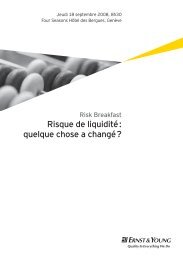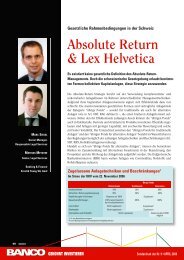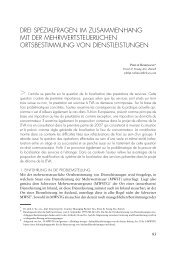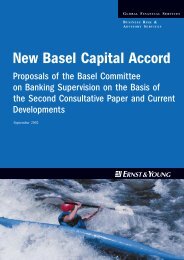Swiss Biotech Report 2006
Swiss Biotech Report 2006
Swiss Biotech Report 2006
Create successful ePaper yourself
Turn your PDF publications into a flip-book with our unique Google optimized e-Paper software.
... HAVE GOTTEN BETTER25Thomas Bieri (Executive Director, Investment BankingUBS), Irene Püttner (Fund Manager Bank Sarasin)factors like oil prices, interest rates, etc., can curb thisappetite again.Maurice Pedergnana: The deal flow and fundraisingare still on the upswing. High prices also put realpressure on general partners to add value to their investments,and competition among limited partnershipfunds is growing.How do you assess the valuation of the biotechsector?Thomas Bieri: Valuations are always highly relative.Although the tech and biotech sector in Europe isgenerally valued somewhat lower than its US counterpart,these differences vary and have become smallerin the last two years and there are also big valuationdifferences within Europe. It is generally more difficultto make specific valuation comparisons in the biotechsector than in other industries since most companiesshow losses and thus the traditional market multiplessuch as the P/E ratio cannot be applied.The valuations of biotech firms therefore reflect notso much a company’s specific numerical benchmarksbut primarily base on investors’ know-how, belief inthe potential of a company and willingness to incurrisks. It is precisely these investor characteristics thattend to exist more widely in Switzerland than on average,and this can have a positive impact on valuationin the case of an IPO.Maurice Pedergnana: We will see further growth in<strong>2006</strong>, judging by current trends. Some players havebeen paying high premiums to win deals. High pricesalso put real pressure on GPs to add value to theirinvestments and competition among LP funds is growing.But I am positive considering the long-term successrate of biotech investments in Switzerland.Irene Püttner: I agree that companies in Europe tendto be undervalued and that this is strongly tied toperception and willingness to incur risks, which is influencedby the culture. European investors are convincedby a company’s track record, whereas USinvestors take greater risks at an earlier stage. Moreover,the US biotech industry has a 30-year history andtherefore more mature companies that have scoredbig successes. But we are well on our way in Europe.Yvonne Wegmann: From the perspective of the companies,valuation levels must be viewed in relation toIPO costs. Regulatory burdens and costs for listedcompanies have increased significantly in the last fewmonths in the US, which makes both going and beingpublic much more complicated and costly there thanin Europe.The <strong>Swiss</strong> and European biotech industries are onthe right track. What kind of potential do you seefor the future?Thomas Bieri: The success of an industrial sector ultimatelyrises and falls with a few big success stories.The European biotech industry is still young, and thereally big success stories have not yet occurred. If thesuccess of the biotech business model can be exemplifiedin the future by a few specific success stories,this should boost the potential of the entire industry.Maurice Pedergnana: In Switzerland, SECA providesaccess to a professionalised network related to theprivate equity industry. This reduces transactioncosts and establishes a favourable environment forfurther deal flow. And there is a new managementgeneration that wants to take advantage of intensecompetition among investors.Irene Püttner: On the company or stock level, progressin the development of technologies and productswill continue to be crucial. In addition, the globalpharmaceutical industry has recognised the potentialof the biotech industry and is willing to reach deepinto its pockets to finance innovative products. Thisand the good track record of some listed companiesis strengthening investor confidence.Yvonne Wegmann: The maturity level of the <strong>Swiss</strong>and British biotech industries is the highest in Europe,considering pipelines and company sizes. InSwitzerland, the liberal environment in the four biotechclusters, the various successful technology transferinitiatives, the proximity to the large pharmaceuticalcompanies, and the well-functioning private andpublic capital markets provide an excellent foundationfor successful further development of the biotech industry.In addition, the pipeline of both <strong>Swiss</strong> and foreignIPO candidates at the SWX continues to be verypromising.Harry Welten: The challenge is to expand on the progressmade to date and to make continued efforts,especially in the area of financing.
















